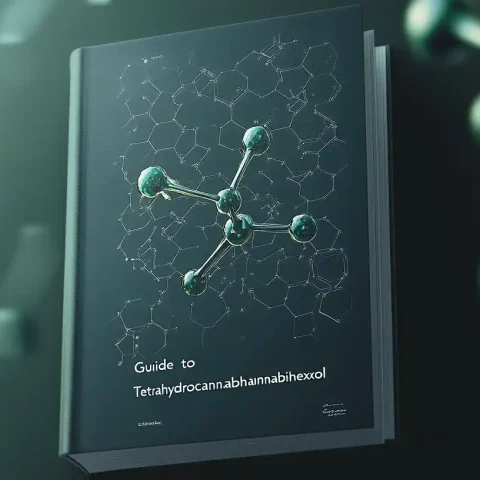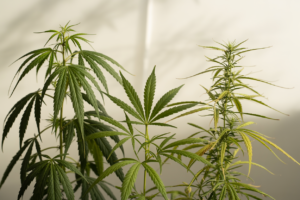- Latest research on THCH potency, effects & legal status explained
THCH: The Complete Guide to Tetrahydrocannabihexol (2024)

Contents
Contents
Introduction to THCH
THCH (Tetrahydrocannabihexol) emerged as a new cannabinoid, changing our understanding of cannabis compounds. This compound is estimated to be 10-20 times stronger than Delta-9-THC, making it one of the most potent cannabinoids known. As research continues, THCH is gaining attention for its psychoactive effects and potential therapeutic uses, including pain management and anti-inflammatory benefits.
THCH’s rise in 2024 reflects growing interest from both scientists and consumers. With more availability through licensed producers and ongoing studies, THCH represents a major step forward in cannabinoid research.
What is THCH?
THCH has a unique chemical structure, with a hexyl side chain of six carbon atoms compared to the five-carbon pentyl chain of Delta-9-THC. This difference enhances its binding with CB1 receptors in the brain, contributing to its effects and therapeutic potential.
THCH occurs naturally in small amounts in cannabis, but commercial production relies mostly on synthetic methods for consistency and purity. This ensures quality control and standardization for research and consumer products. Current research focuses on THCH’s potential applications in:
- Chronic pain management
- Inflammatory conditions
- Neurological disorders
- Mental health applications
- Sleep regulation
Third-party laboratory testing confirms both purity and potency, ensuring product safety and reliability for research and therapeutic applications.
Chemical Structure of THCH

Chemical structure diagram comparing THCH and Delta-9-THC, THCB and THCP highlighting the hexyl vs. pentyl side chains.
Molecular Composition
THCH has a distinctive hexyl side chain, setting it apart from other cannabinoids. The six-carbon chain of THCH, compared to the five-carbon chain of Delta-9-THC, alters how it interacts with the endocannabinoid system.
Key Structural Elements
- Hexyl Side Chain: 6 carbon atoms (C6H13-)
- Base Structure: Similar to Delta-9-THC
- Molecular Enhancement: Extended alkyl chain
- Binding Profile: Enhanced CB1 receptor affinity
Impact of Structural Differences
The extended hexyl chain provides THCH with unique properties:
- Increased lipid solubility
- Enhanced blood-brain barrier penetration
- Stronger cannabinoid receptor binding
- 10-20x higher potency compared to Delta-9-THC
Structural Significance
As a homologue of Delta-9-THC, THCH demonstrates how minor molecular modifications can significantly impact cannabinoid effects. This structural variation affects:
- Receptor binding efficiency
- Psychoactive potency
- Therapeutic potential
- Absorption rates
Production and Synthesis of THCH
Natural vs. Synthetic Production
THCH (Tetrahydrocannabihexol) exists naturally in cannabis plants but in microscopic quantities—often less than 0.1% by dry weight. This scarcity has driven the development of efficient synthetic production methods, making laboratory synthesis the primary source for commercial THCH products in 2024.
Flowchart depicting the synthetic production process of THCH, including terpenylation, precursor modification, and purification steps.
The synthesis of THCH involves several key processes:
Primary Synthesis Techniques
- Terpenylation Process: Creation of the hexyl side chain
- Precursor Modification: Molecular structure engineering
- Isomer Control: Precise stereochemistry management
- Purification Steps: Multi-stage refinement process
Laboratory Controls
- Temperature Regulation: ±1°C precision
- Pressure Monitoring: Controlled atmosphere
- Reaction Time Optimization
- Solvent Purity Verification
Quality Assurance Protocol
Modern THCH production implements a comprehensive quality control system:
Testing Standards
- Potency Analysis: HPLC verification
- Purity Testing: 98%+ purity requirement
- Contaminant Screening: Heavy metals, pesticides, solvents
- Stability Testing: Shelf-life verification
Quality Certifications
- ISO laboratory standards
- GMP manufacturing practices
- Third-party laboratory verification
- Batch-specific COAs (Certificates of Analysis)
Potency and Effects of THCH
Comparative Potency
Based on the available information, here is a comparative analysis of the potency of THCH, Delta-9-THC, and CBD, presented in a table format. This table illustrates their relative binding efficiencies and effects.
Comparison of Potency: THCH, Delta-9-THC, and CBD
| Compound | Binding Efficiency (Relative) | Psychoactive Effects | Therapeutic Uses |
|---|---|---|---|
| Delta-9-THC | High | Strong euphoria, relaxation | Pain relief, appetite stimulation, nausea reduction |
| THCH | Potentially higher than Delta-9-THC | Similar to or smoother than Delta-9-THC | Emerging research suggests potential for pain relief and anti-inflammatory effects |
| CBD | Low | Non-psychoactive | Anti-inflammatory, anxiety reduction, seizure control |
Primary Effects Profile
Immediate Effects (0-30 minutes)
- Rapid onset euphoria
- Enhanced sensory perception
- Increased mental stimulation
- Potential mood elevation
Peak Effects (30-120 minutes)
- Deep physical relaxation
- Heightened cognitive effects
- Intense body sensation
- Enhanced sensory awareness
Duration
- Onset: 5-15 minutes (inhalation)
- Peak: 1-2 hours
- Total duration: 4-8 hours
- After-effects: Up to 12 hours
Therapeutic Applications
Pain Management
- Chronic pain relief
- Inflammatory condition treatment
- Neuropathic pain reduction
- Arthritis symptom management
Mental Health Support
- Anxiety management potential
- Depression symptom relief
- Sleep disorder treatment
- Mood regulation properties
Safety Considerations
Recommended Precautions
- Start with minimal dosage (1/10th of regular THC dose)
- Wait 2+ hours between doses
- Maintain proper hydration
- Have support person present initially
Possible Side Effects
- Common Effects:
- Dry mouth
- Red eyes
- Mild dizziness
- Increased appetite
- Higher Dose Effects:
- Anxiety
- Paranoia
- Extreme sedation
- Cognitive impairment
Risk Mitigation
- Begin with micro-doses
- Track personal tolerance
- Maintain consistent dosing
- Avoid mixing with other substances
Potential Medical Benefits of THCH
Pain Management
- Chronic pain relief through enhanced CB1 receptor binding
- Anti-inflammatory effects for arthritis and joint conditions
- Neuropathic pain reduction via endocannabinoid system modulation
Mental Health Support
- Anxiety management (with controlled dosing)
- Depression symptom improvement
- Sleep disorder treatment
- Mood regulation benefits
Neuroprotective Properties
THCH shows promise in neurological protection through:
- Reduced inflammatory response
- Oxidative stress management
- Potential benefits for neurological conditions
Current medical research suggests THCH’s heightened potency (10-20x stronger than traditional THC) may provide enhanced therapeutic effects at lower doses. However, medical supervision is essential due to its strength, and more clinical studies are needed to fully understand its long-term efficacy and safety profile.
Note: Always consult healthcare providers before starting any THCH treatment regimen.
Side Effects and Risks of THCH
Immediate Side Effects
Common reactions to THCH include:
- Dry Mouth: Temporary oral discomfort
- Red Eyes: Blood vessel dilation
- Dizziness: Especially during onset
- Increased Appetite: Enhanced hunger sensation
High-Dose Effects
Higher THCH concentrations may cause:
- Severe anxiety or paranoia
- Extreme sedation
- Cognitive impairment
- Coordination difficulties
Safety Guidelines
Dosage Protocol
- Start with 1/10th normal THC dose
- Wait 2 hours between doses
- Track personal reactions
- Document tolerance levels
Risk Prevention
- Stay hydrated
- Have support present
- Avoid driving/machinery
- Store safely away from children
Important Warnings
High-Risk Groups
- First-time users
- Mental health condition carriers
- Pregnant/nursing individuals
- Those on prescription medications
Long-Term Considerations
- Tolerance development potential
- Psychological dependence risk
- Mental health impact
- Cognitive function effects
Remember: THCH’s 10-20x potency vs traditional THC requires extra caution and precise dosing.
Consult healthcare providers before use, especially with pre-existing conditions.
Legal Status of THCH
International Status 🌎
| Region | Current Status |
|---|---|
| United States | ⚠️ Varies by state |
| European Union | ⚠️ Varies by country |
| Canada | 🔴 Not approved |
| Other Countries | ⚠️ Check local laws |
Quick Compliance Guide ✓
- Must be 21+ or 18 to purchase
- Requires lab testing documentation
- Keep proof of purchase
- Check local laws before buying
❗ Important: Laws change frequently. Always verify current local regulations.
Comparison of THCH with Other Cannabinoids
THCH is a potent cannabinoid that stands out because of its unique structure and stronger effects compared to other cannabinoids.
THCH vs. Major Cannabinoids
THCH vs. Delta-9-THC
| Feature | THCH | Delta-9-THC |
|---|---|---|
| Potency | 10-20x stronger | Baseline potency |
| Duration | 4-8 hours | 2-6 hours |
| Side Chain | 6 carbons (hexyl) | 5 carbons (pentyl) |
THCH vs. CBD
| Aspect | THCH | CBD |
|---|---|---|
| Psychoactivity | Strong | None |
| Medical Use | Pain, inflammation | Anxiety, seizures |
| Side Effects | Significant | Minimal |
Key Differences by Effect
Therapeutic Applications
- Pain Management
- THCH: Intense relief, psychoactive
- Delta-9-THC: Moderate relief
- CBD: Mild relief, non-psychoactive
Mental Effects
- Anxiety Treatment
- THCH: Dose-sensitive, potent
- CBD: Well-tolerated, calming
- Delta-9-THC: Moderate effects
Minor Cannabinoid Comparison
THCH vs. THCV
- Appetite effects: Opposite actions
- Psychoactivity: Different intensities
- Duration: THCH longer-lasting
THCH vs. CBG
- Target effects: Different mechanisms
- Medical applications: Distinct uses
- Safety profile: Varying risks
Note: Effects vary by individual. Start with minimal doses when trying THCH.
Methods of Consuming THCH
Primary Consumption Methods
1. Inhalation Methods
Vaporization
- Onset: 5-10 minutes
- Duration: 2-4 hours
- Dosage control: Excellent
- Best for: Quick relief
Traditional Smoking
- Onset: Immediate
- Duration: 2-3 hours
- Dosage control: Good
- Best for: Fast effects
2. Oral Consumption
Edibles
- Onset: 30-90 minutes
- Duration: 6-8 hours
- Dosage control: Precise
- Best for: Long-lasting effects
Capsules
- Onset: 45-75 minutes
- Duration: 6-8 hours
- Dosage control: Exact
- Best for: Medical use
3. Sublingual Options
Tinctures/Oils
- Onset: 15-30 minutes
- Duration: 4-6 hours
- Dosage control: Precise
- Best for: Balanced relief
Method Comparison Table
| Method | Onset Time | Duration | Potency Control |
|---|---|---|---|
| Vaping | 5-10 min | 2-4 hrs | Excellent |
| Edibles | 30-90 min | 6-8 hrs | Good |
| Tincture | 15-30 min | 4-6 hrs | Very Good |
| Topical | 10-20 min | 2-4 hrs | Limited |
Safety Guidelines
Recommended Starting Methods
- Tinctures (beginners)
- Vaporization (experienced)
- Edibles (with caution)
Risk Reduction
- Start with lowest dose
- Wait full onset time
- Keep consumption log
- Use calibrated devices
Important: Due to THCH’s high potency, reduce typical THC doses by 90% when starting.
THCH FAQs
What is THCH?
THCH (Tetrahydrocannabihexol) is a newly discovered cannabinoid that is 10-20 times more potent than Delta-9-THC. It has a unique chemical structure with a hexyl side chain that enhances its binding efficiency to CB1 receptors in the brain.
Is THCH legal?
The legal status of THCH varies. In the United States, it remains largely unregulated at the federal level, and legality can differ significantly from state to state. Globally, regulations also vary, with many countries still forming policies on newly discovered cannabinoids.
How does THCH compare to Delta-9-THC?
THCH is significantly more potent than Delta-9-THC, offering stronger psychoactive effects and longer-lasting impacts. It is estimated to be 10-20 times stronger, making it a powerful alternative for those seeking intense relief.
What are the main methods to consume THCH?
THCH can be consumed through smoking or vaping, edibles, tinctures, or topicals. Each method has different onset times and duration of effects, catering to individual preferences and needs.
Are there side effects of THCH?
Yes, common side effects include dry mouth, red eyes, and increased appetite. High doses may lead to anxiety, paranoia, extreme sedation, or cognitive impairment. It is recommended to start with small doses.
Note: Always consult healthcare professionals before using THCH.
Conclusion
THCH (Tetrahydrocannabihexol) represents a significant advancement in cannabinoid research, offering powerful psychoactive effects and potential therapeutic benefits. However, its high potency requires careful dosing and responsible use. As regulations evolve, informed consumers and ongoing research will be crucial in shaping the future of THCH. Always consult healthcare professionals before incorporating THCH into any wellness routine.
Disclaimer: The information provided in this article is for educational purposes only and should not be construed as medical advice. THCH is a potent cannabinoid, and its use should be approached with caution and under medical supervision. Always consult a qualified healthcare professional before making any decisions related to THCH or other cannabinoids, especially if you have existing health conditions or are taking medication.
Subscribe: Stay updated on the latest in cannabis research, THCH news, and exclusive offers by subscribing to our newsletter. Get valuable insights and updates delivered directly to your inbox to stay informed and make educated choices in the evolving cannabis landscape. [Subscribe Now]!




